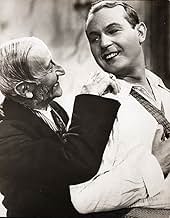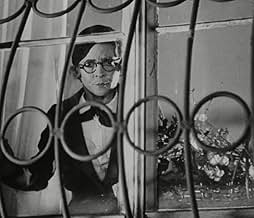Agrega una trama en tu idiomaOpera singer Enrico Ferraro escapes from his manager and too many engagements changing trains for the Riviera. He makes a friend and stops at a village for some well deserved holidays, where... Leer todoOpera singer Enrico Ferraro escapes from his manager and too many engagements changing trains for the Riviera. He makes a friend and stops at a village for some well deserved holidays, where he meets a beautiful girl.Opera singer Enrico Ferraro escapes from his manager and too many engagements changing trains for the Riviera. He makes a friend and stops at a village for some well deserved holidays, where he meets a beautiful girl.
- Dirección
- Guionistas
- Elenco
- Dirección
- Guionistas
- Todo el elenco y el equipo
- Producción, taquilla y más en IMDbPro
Opiniones destacadas
Everybody 's a fan of Enrico Ferraro ,everybody listens to his golden voice ,from the patient on the dentist's chair to the dogs;at the beck and call of a bossy manager ,he wants a rest .On a train ,he gives her the slip and meets an elegant dandy (Pierre Brasseur) who seems to be afraid of the police .
In the town of Monève ,they exchange their identities ;while Koretzky (the false singer) is pampered by the mayor (and wife) ,the opera star is allowed to go for a drive in the country where he meets a pretty girl,Mathilde (Magda Schneider) ,who happens to be the mayor's daughter.
This is a light comedy ,made by famous director Anatole Litvak who gave good movies ("the snake pit" "sorry wrong number" "Mayerling" "all this and Heaven" "the journey movie" ,to name but five)and was already a solid craftsman.
There are really funny situations :the "program " the mayor wants his guest to enjoy (-unveiling of a statue /- a statue to whom?/Dunno!We'll find out) ;it includes the visit of a prison,the thought of which he does not find particularly appealing; the scratched record which fools the rather naive daughter;the serenade under the balcony which lets the cat out of the bag.
Like many movies in the early thirties (see Duvivier,Siodmak ,Pabst),there were two versions :the French one in which the Germans like Schneider are dubbed and the German (Das Lied Einer Nacht" ) one in which it is the other way about.Oddly ,Henri -Georges Clouzot is credited as screenwriter ,but his numerous fans won't find the master's touch.
Almost half a century later ,Magda Schneider's daughter ,the sadly missed Romy ,would team up with Pierre Brasseur's son,Claude, in Claude Sautet's "Une Histoire Simple" .
In the town of Monève ,they exchange their identities ;while Koretzky (the false singer) is pampered by the mayor (and wife) ,the opera star is allowed to go for a drive in the country where he meets a pretty girl,Mathilde (Magda Schneider) ,who happens to be the mayor's daughter.
This is a light comedy ,made by famous director Anatole Litvak who gave good movies ("the snake pit" "sorry wrong number" "Mayerling" "all this and Heaven" "the journey movie" ,to name but five)and was already a solid craftsman.
There are really funny situations :the "program " the mayor wants his guest to enjoy (-unveiling of a statue /- a statue to whom?/Dunno!We'll find out) ;it includes the visit of a prison,the thought of which he does not find particularly appealing; the scratched record which fools the rather naive daughter;the serenade under the balcony which lets the cat out of the bag.
Like many movies in the early thirties (see Duvivier,Siodmak ,Pabst),there were two versions :the French one in which the Germans like Schneider are dubbed and the German (Das Lied Einer Nacht" ) one in which it is the other way about.Oddly ,Henri -Georges Clouzot is credited as screenwriter ,but his numerous fans won't find the master's touch.
Almost half a century later ,Magda Schneider's daughter ,the sadly missed Romy ,would team up with Pierre Brasseur's son,Claude, in Claude Sautet's "Une Histoire Simple" .
Enrico Ferraro, a famous singer tired of his demanding schedule, sees the occasion to take a holiday when his train stops at the same station than another one going to the Swiss riviera in the opposite direction. He jumps off leaving his efficient but unsympathetic manager and feels free at last for some time. On the train he befriends Koretzky, a charming young man with more wits than money, and they stop at a beautiful lakeside village. When Ferraro´s presence is known, alas, and besieging about to begin, he has the brilliant idea of changing places with his new friend and becomes his secretary. Free again to ramble in his car along the villages, he meets Mathilde, the mayor and his family, and will have to think of something to both win his girl and take Koretzky out of trouble when he is impelled to sing.
Full of beautiful songs by Mischa Spoliansky, La Danza tarantella and several operatic arias, this is another fine example of a musical comedy to the best of Polish tenor Jan Kiepura before he would met and marry Hungarian operetta star Martha Éggerth, becoming one of the most beloved musical couples of the day. The opening song, Heute Nacht oder nie/Cette nuit mon amour became a hit of the day and would be covered by several other singers like Kiepura´s contemporary Joseph Schmidt.
As it was customary in those times before dubbing became usual, three versions were shooted : German, English and French. In this case the French one is the finest, mainly because of Pierre Brasseur who has a touch of both elegance and fresh easiness that matches Kiepura´s one, and because he is by far a better false vocalist than Fritz Schulz and does not have the vaudevillian twist of Sonnie Hale but a subtler comicity. Magda Schneider plays in all three versions the naughty and modern girl who knows about car mechanics but fails to avoid falling out of the road because of checking her lipstick. Anatole Litvak directed all three versions, aided by Pierre Colombier in this one.
Stunning Swiss landscapes even in black-and-white, beautiful songs in Kiepura´s energetic delivery, sunshine, fresh air and dancing at night, the riviera, romance and a touch of comedy... it doesn´t need anything else. Enjoy it!
Full of beautiful songs by Mischa Spoliansky, La Danza tarantella and several operatic arias, this is another fine example of a musical comedy to the best of Polish tenor Jan Kiepura before he would met and marry Hungarian operetta star Martha Éggerth, becoming one of the most beloved musical couples of the day. The opening song, Heute Nacht oder nie/Cette nuit mon amour became a hit of the day and would be covered by several other singers like Kiepura´s contemporary Joseph Schmidt.
As it was customary in those times before dubbing became usual, three versions were shooted : German, English and French. In this case the French one is the finest, mainly because of Pierre Brasseur who has a touch of both elegance and fresh easiness that matches Kiepura´s one, and because he is by far a better false vocalist than Fritz Schulz and does not have the vaudevillian twist of Sonnie Hale but a subtler comicity. Magda Schneider plays in all three versions the naughty and modern girl who knows about car mechanics but fails to avoid falling out of the road because of checking her lipstick. Anatole Litvak directed all three versions, aided by Pierre Colombier in this one.
Stunning Swiss landscapes even in black-and-white, beautiful songs in Kiepura´s energetic delivery, sunshine, fresh air and dancing at night, the riviera, romance and a touch of comedy... it doesn´t need anything else. Enjoy it!
¿Sabías que…?
- TriviaCharlotte Lysès's debut.
- ConexionesAlternate-language version of Das Lied einer Nacht (1932)
Selecciones populares
Inicia sesión para calificar y agrega a la lista de videos para obtener recomendaciones personalizadas
Detalles
- Fecha de lanzamiento
- Países de origen
- Idioma
- También se conoce como
- Tell Me Tonight
- Locaciones de filmación
- Productoras
- Ver más créditos de la compañía en IMDbPro
- Tiempo de ejecución
- 1h 25min(85 min)
- Color
- Mezcla de sonido
- Relación de aspecto
- 1.20 : 1
Contribuir a esta página
Sugiere una edición o agrega el contenido que falta
























